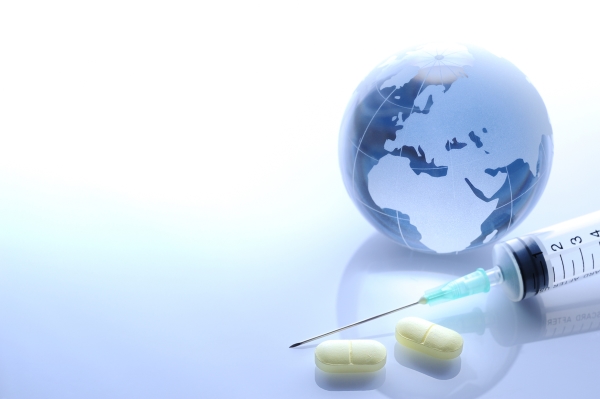
Up to 50 per cent of the cardiovascular drugs sold in several African countries are deemed "poor quality", research has revealed.
The study, published in the International Journal of Cardiology, assessed the quality of seven routinely used cardiovascular meds in 10 Sub-Saharan African countries by measuring the expected dosage of the active ingredients.
The drugs included an anticoagulant (acenocoumarol), a statin (simvastatin), and five antihypertensive drugs: furosemide, hydrochlorothiazide (diuretics), captopril (angiotensin-converting enzyme inhibitor), atenolol (beta-blocker) and amlodipine (calcium channel blocker).
The 3,468 samples were taken between 2012 and 2014 from licensed pharmacies and unlicensed street markets in the countries' capitals and from a border city for three of the countries. Of the collected samples, 1,530 were assessed for quality.
The results of the SEVEN Study showed that 16.3 per cent of the tested samples were considered poor quality with the active ingredient present in lower than expected doses.
However, the prevalence of poor quality "significantly increased" in certain specific drugs – such as amlodipine (29 per cent) and captopril (26 per cent) yet there were zero poor quality samples of acenocoumarol.
Poor quality was also significantly seen in generic versions (23 per cent) and in drugs produced in Asia (35 per cent). Branded drugs were less likely to be of poor quality (2.3 per cent).
There was no follow-up in the assessment to test whether the low quality was a result of substandard production or deliberate falsification, but this will be addressed in follow-up studies.
The research, which was exclusively supported by a public grant in order to avoid any conflict of interest with the pharmaceutical industry, also found that the proportion of poor quality drugs reached 50 per cent when drugs produced in Asia were sold in street markets. The study also showed that very low quality samples were only obtained from unlicensed street markets.
"In this first study on the quality of cardiovascular drugs in Africa, we found a significant proportion of poor quality drugs with a little over one in every six samples tested being of poor quality," the report said.
"Sub-standard cardiac medicines pose a serious health hazard and result in significant morbidity and mortality… unknown variability in the quality of drugs such as anticoagulants can lead to incorrect dosage adjustments resulting in serious adverse events such as thrombosis, stroke, bleeding or death."
The researchers, a team of epidemiologists, cardiologists and pharmacists from France and Africa, noted that most efforts to assess drug standards have focused almost exclusively on antimicrobial drugs, such as for HIV and malaria, with the World Health Organization (WHO) estimating that nearly 100,000 deaths a year are caused by counterfeit drugs in Africa.
But cardiovascular drugs in Africa have become more prevalent as the incidence of cardiovascular disease rises in developing countries.
"This study shows that we must all be vigilant to assure that the medications capable of saving and extending healthy lives for our patients are of full potency and not fake versions," write Raymond Woosley of the University of Arizona in the US and Peter Schwartz of Italy's Laboratory of Cardiovascular Genetics in Milan in an accompanying editorial.
"The majority of medical doctors working in the Western world lives in a state of 'ignorant bliss' and are completely unaware of the extent and far reaching impact of this poorly regulated industry," they add.
In the study, the drugs were classified into three types based on percentage ratio of measured to expected dosage of active ingredient, where: type A was good quality (95 per cent to 105 per cent); type B was low quality (85 to 94.99 per cent or 105.01 to 115 per cent); and type C was very poor quality: <85 per cent or >115 per cent. So, whenever the active ingredient ratio (measured to expected) was under 94.99 per cent or >105.01 per cent (types B and C), drugs were deemed to be poor quality. The team used a validated reversed-phase liquid chromatography with tandem mass spectrometry method to assess the exact quantification of the active ingredient.
Other findings from the study included: 3.6 per cent of the tested samples were unknown versions as the drugs had been repacked; the batch number and date of manufacture were mentioned on the label in 92.1 per cent and 58.0 per cent of the samples respectively; 10 samples were past-expiry, while the expiry date was unknown for 7.5 per cent of the samples.
Meanwhile, a total of 34 different named manufacturers were identified on the labels. Places of manufacture were Europe (63.4 per cent), Asia (15.4 per cent), Africa (11.1 per cent) and unknown (10.1 per cent).
The researchers found that the opacity of packaging, city of purchase (capital or border city) and income level of country (low or low-middle income) were not associated with the quality of collected samples.
The researchers called for continued monitoring of drugs in Africa. "The association of poor quality with some manufacturing locations highlights the need to strengthen monitoring and regulations in these areas. The ground realities may be even more challenging, given the lack of political will and rampant corruption in many third world nations. Education toward this regard, improving the public knowledge and concerted monitoring strategies at the international level to enforce quality standards may help."
They also said they will commit that the Department of Laboratories in Paris (AGEPS, AP-HP) will continue to assess the quality of the seven cardiovascular drugs for free for the next five years "to give help in efforts to tackle the counterfeit/substandard menace".
The 10 countries involved in the study were: Benin, Burkina-Faso, Congo-Brazzaville, the Democratic Republic of Congo, Guinea, Côte d'Ivoire, Mauritania, Niger, Togo and Senegal.
©
SecuringIndustry.com





